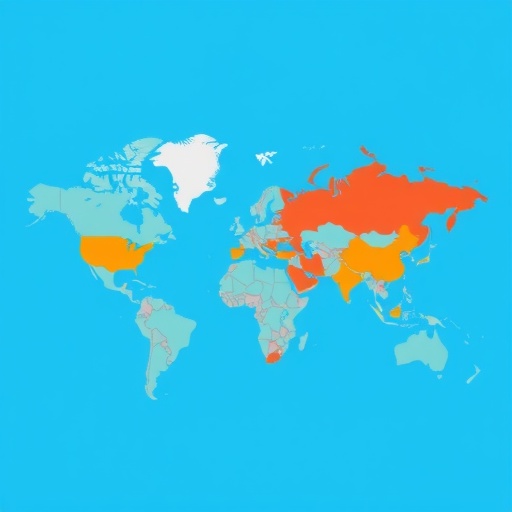A recent groundbreaking study led by researchers at the University of Georgia offers intriguing insight into how historical disease exposure influences optimism about humanity’s future. Contrary to what one might expect, individuals residing in regions historically burdened by high disease prevalence tend to hold more hopeful and positive views regarding the trajectory of human civilization. This counterintuitive finding challenges conventional assumptions, suggesting an evolutionary basis for optimism that may enhance survival and well-being amid adversity.
In exploring the psychological mechanisms behind this phenomenon, the research posits that optimism in the face of adversity could be an adaptive response shaped by natural selection. The ability to maintain a positive outlook during times of hardship potentially provides tangible physical and mental health benefits, conferring resilience against environmental stressors such as widespread disease. Optimistic individuals may experience lower levels of stress-induced physiological damage, bolstering immune function and aiding recovery from illness.
Brian Haas, associate professor at the University of Georgia’s Franklin College of Arts and Sciences and lead author of the study, highlights that positivity may serve as a coping strategy when survival risks are elevated. “When conditions are challenging, adopting a belief that humanity’s future is bright can serve multiple beneficial functions,” Haas explains. This form of hopeful thinking encourages persistence and adaptation, potentially improving collective and individual chances of survival across generations.
The study assessed over 18,000 participants representing 68 countries, examining their perceptions of humanity’s current quality of life and projections 1,000 years into the future. Results demonstrated a robust correlation: respondents from countries with a higher historic pathogen burden, such as Angola, Vietnam, and Venezuela, more frequently predicted that global life quality would improve markedly in the millennia ahead. Conversely, respondents from nations with relatively low disease exposure, including France, Germany, South Korea, and the United Kingdom, held more tempered or neutral expectations for the future.
Notably, American participants fell into an intermediate category, expressing a moderate level of optimism about humanity’s path forward. This gradient of outlooks suggests a multifactorial influence on worldview, shaped not only by immediate socioeconomic conditions but by deep-rooted evolutionary pressures linked to historical disease environments. Such findings compel reconsideration of how environmental challenges sculpt collective psychological resilience.
Scientists controlled for numerous variables known to affect optimism and quality-of-life assessments, including life expectancy and economic stress, to isolate the specific influence of disease prevalence. The persistent association between pathogen burden and future-oriented optimism implies a distinct psychological adaptation rather than a simple reflection of current hardships. This adaptation may function as an unconscious survival tactic enhancing group cohesion and motivation in perilous settings.
The health implications of sustained optimism are well-documented. Prior studies indicate that individuals maintaining a hopeful outlook demonstrate lower rates of cardiovascular disease and experience faster recovery from various illnesses. Psychological resilience rooted in positivity reduces oxidative stress and limits inflammatory responses, key physiological pathways through which chronic stress exacerbates disease progression. These mechanisms provide plausible biological underpinnings linking optimistic attitudes to enhanced health outcomes.
The COVID-19 pandemic provided a contemporary example reinforcing the study’s conclusions. Healthcare workers exhibiting higher optimism levels reported reduced burnout and less depressive symptomatology despite intense professional demands and infection risk. Such psychological fortitude not only benefits individuals but also stabilizes healthcare systems by maintaining workforce capacity during crises, underscoring the communal value of adaptive optimism.
The generational transmission of optimism is another compelling aspect explored. The research suggests that hopeful beliefs about humanity’s future are not merely individual traits but can permeate social networks and cultural narratives, fostering a collective identity aligned with perseverance. This shared positivity may be encoded through socialization processes, reinforcing resilient mindsets across generations and contributing to long-term societal adaptability.
Moreover, the study sheds light on the broader implications of how populations interpret existential threats and envision progress. While realism remains necessary to confront immediate challenges, balancing it with an evolutionary-honed optimism may provide crucial psychological resources—protecting mental health, enhancing recovery rates, and promoting pro-social behaviors instrumental for overcoming shared risks.
Published in the journal Personality and Individual Differences, this extensive collaboration involving over 50 international researchers represents one of the most comprehensive analyses of psychological responses to historical disease environments to date. The interdisciplinary nature of the project integrates social psychology, evolutionary biology, epidemiology, and public health, offering a novel framework for understanding optimism as a complex adaptive trait.
This research invites future inquiries into the neurobiological pathways mediating optimism’s protective effects and how interventions might harness this adaptive trait to bolster resilience in both individuals and communities facing contemporary health threats. Ultimately, recognizing the interconnectedness of disease ecology and human psychology opens promising avenues for enhancing global well-being amid persistent and emerging challenges.
Subject of Research: Human psychological adaptations to historical pathogen prevalence and optimism about humanity’s future
Article Title: Beliefs about a brighter future for all humanity as an evolutionary adaptation to pathogen prevalence
News Publication Date: 1-Dec-2025
Web References: http://dx.doi.org/10.1016/j.paid.2025.113398
Keywords: Social sciences, Social psychology, Pathology




